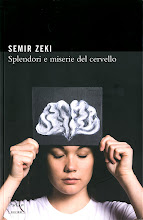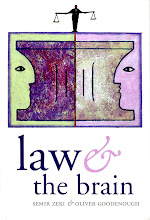Why, I wonder, do I [and many others] get a satisfaction (or kick) when something so self-evident, which we had become so accustomed to predicting, turns out to be true? Why does not the brain adapt to repeated exposure and become indifferent, instead of satisfied.
On London Underground, “No exit” usually means “short cut”. This is true most of the time but not always. So whenever I take the exit marked “No exit” and find that it is indeed a short cut, I feel well pleased, as if I had discovered something new, when in fact I have not. I suppose the fact that it is not always true gives me the thrill of knowing that I had predicted correctly, for I could have got it wrong.
The same is true of politicians, at least in the UK. Whenever the Prime Minister of the UK declares that a minister who had been caught in some scandal or another has “my full support and backing”, it is almost certain that the said minister will resign sooner rather than later. But it is not always so, which is perhaps why we are satisfied when we get the prediction that the minister will resign right, even if past experience shows that our prediction is likely to be right.
Consider next the vehement protests of the Irish Government that they will not seek a bail-out, that they will refuse to borrow more money to get themselves out of debt (a somewhat ridiculous situation when one thinks about it). The more vehement the denial, the more apparent it became that they would seek a bail-out, which is what they did in the end. But there always remained the possibility that they may not, which is what gives us the satisfaction of having made the correct prediction. If we had known it as a certainty that the denials meant that they would actually borrow the money to process the debt resulting from borrowing money, maybe we would have less satisfaction with our prediction, which results from our knowledge that politicians lie.
Currently, the Portuguese Government is angrily denying that they it seek a financial bail-out, a denial echoed by the President of the European Commission, Mr Barosso, who was “absolutely” certain that this would not happen.
Well, my prediction is that it will; and if I turn out to be correct, I shall feel a certain satisfaction at having been correct. We will wait and see.
The general point I am making is that, even when the brain becomes accustomed to the fact that certain statements mean the opposite, it still entertains the possibility that, on some occasions, the statements are correct. And hence, when it finds that its predictions are correct, it gets some satisfaction, even if the predictions are what would be expected from past history anyway.
All of which points to some interesting brain experiments on prediction.
Monday, November 29, 2010
Biological necessity for having more women in top economic posts
In an editorial last week, The Financial Times strongly supported the appointment of more women to boardroom roles, saying that the “number of women on UK boards is lamentably low”, thus echoing what I wrote here some time ago. But The Financial Times uses different arguments, based on diversity and equal opportunity. The case that I would like to make for more women being on boards of companies and in top economic positions is perhaps a little more radical. It is based on biological differences between male and female brains which, in many instances, works to the advantage of women and ultimately to that of society as well.
One such difference is that women, through biological inclination, are more risk aversive than men. This is, I think a biological imposition, since women have to think more carefully of building a stable environment for growth of the family in as prosperous social conditions as possible. It is likely, therefore, that they would be more prudent in their management of the economy. Had I been in power, I would probably insist that the job of Minister of Finance (in Britain, Chancellor of the Exchequer) should always go to a woman; I would probably also want to ensure that a woman is minister for housing and perhaps even for army supplies. I do not believe that men are as good at these jobs. In fact, as it turns out (also reported in The Financial Times some time ago and about which I wrote here), “the more women there were in a company’s management [in France], the less the share price fell in 2008”.
It is interesting to note that, in the latest documents released by Wikileaks, one from a US diplomat in Berlin describes the German Chancellor, Angela Merkel, as “risk aversive” – presumably pejoratively.
Well, we know what all those risk-prone men in top economic jobs, together with their male economic advisors, did to the world economy.
So perhaps being risk aversive in certain areas is not such a bad thing after all.
One such difference is that women, through biological inclination, are more risk aversive than men. This is, I think a biological imposition, since women have to think more carefully of building a stable environment for growth of the family in as prosperous social conditions as possible. It is likely, therefore, that they would be more prudent in their management of the economy. Had I been in power, I would probably insist that the job of Minister of Finance (in Britain, Chancellor of the Exchequer) should always go to a woman; I would probably also want to ensure that a woman is minister for housing and perhaps even for army supplies. I do not believe that men are as good at these jobs. In fact, as it turns out (also reported in The Financial Times some time ago and about which I wrote here), “the more women there were in a company’s management [in France], the less the share price fell in 2008”.
It is interesting to note that, in the latest documents released by Wikileaks, one from a US diplomat in Berlin describes the German Chancellor, Angela Merkel, as “risk aversive” – presumably pejoratively.
Well, we know what all those risk-prone men in top economic jobs, together with their male economic advisors, did to the world economy.
So perhaps being risk aversive in certain areas is not such a bad thing after all.
Sunday, November 14, 2010
Denial of blindness and mind blindness (or denial states)
A correspondent has asked me whether there is any visual equivalent to the state I described in yesterday's post about peri-personal space.
Well, not exactly but there is something similar known as anosognosia. This is a condition in which humans blinded by lesions to their primary visual cortex (V1) become completely blind and yet deny being blind. The denial is, as I understand it, persistent. In other words, when they bump into objects and cannot identify them visually, they still deny that they are blind.
This raises interesting and important questions about brain mechanisms that determine perceptual states and the extent to which such mechanisms are under the control of further brain mechanisms which dictate and determine knowledge.
There is yet another syndrome, which has more general applicability. It is a term no longer in use, because advances in our understanding of how the visual brain works have made the term inappropriate. But in the early stages of neurology it described states when, following lesions in the brain, patients could see but could not understand what they had seen. The neurologist Hermann Munk called this syndrome Seelenblindheit, and was usually referred to in English as mind blindness.
I think that the term should be re-introduced to describe certain groups of humans, amongst whom I include politicians but also a good number of academics (economists do not fit into this category for they seem incapable of either seeing or understanding the economic picture).
Blithely those suffering from mind blindness persevere even in spite of the knowledge that their senses and intellect gives them. They are mind blind, or in states of denial. When they are cured of their mind blindness by some mysterious cortical mechanims, it is often too late.
By re-introducing the term, we might be able to take the syndrome more seriously and study it neurobiologically. It may yet give us important insights about the knowledge-acquiring system of the brain.
Well, not exactly but there is something similar known as anosognosia. This is a condition in which humans blinded by lesions to their primary visual cortex (V1) become completely blind and yet deny being blind. The denial is, as I understand it, persistent. In other words, when they bump into objects and cannot identify them visually, they still deny that they are blind.
This raises interesting and important questions about brain mechanisms that determine perceptual states and the extent to which such mechanisms are under the control of further brain mechanisms which dictate and determine knowledge.
There is yet another syndrome, which has more general applicability. It is a term no longer in use, because advances in our understanding of how the visual brain works have made the term inappropriate. But in the early stages of neurology it described states when, following lesions in the brain, patients could see but could not understand what they had seen. The neurologist Hermann Munk called this syndrome Seelenblindheit, and was usually referred to in English as mind blindness.
I think that the term should be re-introduced to describe certain groups of humans, amongst whom I include politicians but also a good number of academics (economists do not fit into this category for they seem incapable of either seeing or understanding the economic picture).
Blithely those suffering from mind blindness persevere even in spite of the knowledge that their senses and intellect gives them. They are mind blind, or in states of denial. When they are cured of their mind blindness by some mysterious cortical mechanims, it is often too late.
By re-introducing the term, we might be able to take the syndrome more seriously and study it neurobiologically. It may yet give us important insights about the knowledge-acquiring system of the brain.
Saturday, November 13, 2010
Experienced and un-experienced extensions of body parts
A well documented syndrome is that of phantom limbs, in which sensations from an amputated limb do not disappear but remain and are often painful. Subjects with this syndrome may also feel that they are able to move their limbs. In short, a missing part is not necessarily experienced as missing, even when the subject knows that it is missing.
I presume that someone born with one limb missing will not experience that limb. From which it follows that the phenomenon is due to the persistence in the brain of some record of that limb, even in its absence.
There is a counterpart to this condition, which I experience on a regular basis in the streets and the Underground system of London. People carrying backpacks or bags do not seem to be aware of the extension of their bodies, and hence are quite happy to invade my peri-personal space. They do not do so with their actual bodies, but with the artificial extensions to their bodies. They brush against me continually, sometimes forcefully, without even being aware of having done so.
Thus the brain does not appear to accommodate, in its calculation of the space occupied by the body to which it belongs, any artificial extensions of that body, even when such artificial extensions become daily props.
Presumably, if the artificial extension becomes a permanent fixture, the brain may gradually take account of it. But this must be a very long process, assuming that it occurs at all.
The result is of course most irritating, because people around us invade our peri-personal space continually, brushing against us with the artificial extensions to their bodies. A Japanese colleague of mine told me that this kind of peri-personal space invasion is much frowned upon and disliked in Japan. Good for the Japanese.
This irritating invasion of other peoples’ space by artificial extensions to the body, if appropriately studied, may give us useful hints about how the brain represents the body of which it is a part.
I presume that someone born with one limb missing will not experience that limb. From which it follows that the phenomenon is due to the persistence in the brain of some record of that limb, even in its absence.
There is a counterpart to this condition, which I experience on a regular basis in the streets and the Underground system of London. People carrying backpacks or bags do not seem to be aware of the extension of their bodies, and hence are quite happy to invade my peri-personal space. They do not do so with their actual bodies, but with the artificial extensions to their bodies. They brush against me continually, sometimes forcefully, without even being aware of having done so.
Thus the brain does not appear to accommodate, in its calculation of the space occupied by the body to which it belongs, any artificial extensions of that body, even when such artificial extensions become daily props.
Presumably, if the artificial extension becomes a permanent fixture, the brain may gradually take account of it. But this must be a very long process, assuming that it occurs at all.
The result is of course most irritating, because people around us invade our peri-personal space continually, brushing against us with the artificial extensions to their bodies. A Japanese colleague of mine told me that this kind of peri-personal space invasion is much frowned upon and disliked in Japan. Good for the Japanese.
This irritating invasion of other peoples’ space by artificial extensions to the body, if appropriately studied, may give us useful hints about how the brain represents the body of which it is a part.
Subscribe to:
Posts (Atom)









 Contact us
Contact us